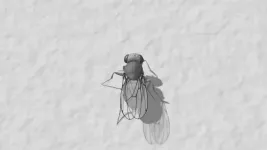(Press-News.org) COLUMBUS, Ohio – People with aphasia have more trouble coming up with words they want to use when they’re prompted by images and words that carry negative emotional meaning, new research suggests.
The study involved individuals whose language limitations resulted from damage to the brain caused by a stroke – the most common cause of aphasia, affecting at least one-third of stroke survivors. The disorder impairs the expression and understanding of language as well as reading and writing.
Researchers from The Ohio State University who led the study said the findings – suggesting that prompts with negative and even positive emotional context can disrupt word retrieval – have implications for clinical assessments and therapy, where the potential influence of emotion may not be taken into account. And because many patients already feel isolated by the condition, they said, insights from this study could help reduce interference with communication efforts by people with aphasia in multiple settings.
“Emotions are a big part of having aphasia – it impacts your quality of life drastically,” said first author Deena Schwen Blackett, who completed this work as a graduate student in speech and hearing science at Ohio State.
“The fact that an emotional reaction interferes with the ability of people with aphasia to come up with words – on top of how hard it already is – could validate their experience if they’re saying that a heightened emotional state makes it harder for them to communicate, so they might need to keep their environment mellow.”
The study was published recently in the journal Neuropsychologia.
Though previous research has found that emotional stimuli can improve performance by people with aphasia on auditory comprehension, reading and writing, and repetition tasks, this is one of the first such studies of emotions’ effects on word retrieval, said senior author Stacy Harnish, associate professor of speech and hearing science at Ohio State.
“This has practical implications but also theoretical significance,” Harnish said. “When we see behavior across people pointing to differences between emotional versus non-emotional words, that tells us something is going on in the brain to process these stimuli differently. So that warrants interrogating it more, figuring out why that is and building on it.”
The study involved 13 people with aphasia and 13 neurotypical people as controls who participated in four single-word naming tasks: two image-based tasks to name objects or actions represented by a picture, and two word-based tasks to name words that fit into a category or verbs that logically accompany the word used as a prompt.
The pictures and words used as stimuli had been previously validated as carrying either negative or positive emotional context or as neutral. Negative pictures included skull, garbage and kick and negative words included disaster, poison and mold. Positive pictures included images of bunnies and a waterfall, while positive words included food and pillow. In all, the tasks added up to 219 image and word prompts divided equally into negative, positive or neutral context categories.
Though there was some nuance and variation to the results, a pattern emerged in people with aphasia as a group. Emotional pictures and words, primarily those with negative meaning but also many with positive contexts, resulted in worse naming performance in terms of word accuracy and in the time it took to respond compared to results from neutral word and image prompts.
Results showed similar effects of emotional stimuli on neurotypical study participants’ performance on word retrieval tasks, though to a lesser degree – hinting that there could be some universality to how emotions place demands on the brain that compromise this specific type of language processing.
In fact, Schwen Blackett expected an earlier study she led in people who didn’t have aphasia to show that emotions surrounding stimuli would generate a strong performance in word retrieval – possibly by harnessing the right brain hemisphere to give a boost to language processing in the left hemisphere. But she found just the opposite to be true in a single word-retrieval task.
“So this new study using varied tasks was validating, and replicated those findings – we saw the same thing in people with mild to moderate aphasia but to a greater magnitude than what was seen in neurotypical people,” said Schwen Blackett, now a postdoctoral fellow at the Medical University of South Carolina.
Harnish and Schwen Blackett theorized that simultaneous emotional arousal and language processing led to fragmentation in the brain’s attention capabilities: Overlapping regions involved in both types of processing are triggered to tend to the physiological and memory components of an emotional response, which interferes with the focused attention on language required to perform well on word retrieval.
The team said more research is needed to fully understand the effect of emotional stimuli in people with aphasia, including in patients with differing aphasia origins.
“Deena’s work is at the forefront of emotional processing in word retrieval,” Harnish said. “We want to build on it now and see where it goes.”
This work was supported by grants from the National Institute on Deafness and Other Communication Disorders.
Additional co-authors were Shari Speer and Xueliang Pan of Ohio State and Joan Borod of Queens College.
#
Contacts:
Stacy Harnish, Harnish.18@osu.edu
Deena Schwen Blackett, Blackett@musc.edu
Written by Emily Caldwell, Caldwell.151@osu.edu; 614-292-8152
END
Key Takeaways
Young women under the age of 30, Black women, and women with lower education levels are disproportionately affected by intimate partner homicide during pregnancy, reflecting the need to better serve and protect these vulnerable populations.
Particularly by firearms, increasing rates of intimate partner homicide of women who are pregnant or recently pregnant are occurring in states that have limited access to abortion.
Researchers describe a ‘dire ...
While combing through the human genome in 2007, computational geneticist Pardis Sabeti made a discovery that would transform her research career. As a then postdoctoral fellow at the Broad Institute of MIT and Harvard, Sabeti discovered potential evidence that some unknown mutation in a gene called LARGE1 had a beneficial effect in the Nigerian population. Other scientists had discovered that this gene was critical for the Lassa virus to enter cells. Sabeti wondered whether a mutation in LARGE1 ...
Feb. 8, 2024
Contact: Katherine McAlpine, 734-647-7087, kmca@umich.edu
Image
Leader in robotics at U-M and beyond elected to National Academy of Engineering
Dawn Tilbury is recognized for advances in manufacturing network control and human-robot interaction, as well as engineering leadership
ANN ARBOR—Dawn Tilbury, the Ronald D. and Regina C. McNeil Department Chair of Robotics at the University of Michigan, has been recognized with one of engineering's greatest honors—election to the National Academy of Engineering.
NAE members are outstanding researchers, ...
A competitive U.S. Department of Education program that prepares undergraduate students interested in careers in academic research has selected 16 undergraduate students from The University of Texas at Arlington to join.
The McNair Scholars Program was named for physicist and astronaut Ronald E. McNair, the second Black astronaut in U.S. history and one of several crew members killed when the space shuttle Challenger exploded on Jan. 28, 1986. The program assists qualified first-generation ...
ITHACA, N.Y. – Cornell University researchers have identified a new way to harness the antioxidant and antibacterial properties of a botanical compound to make nanofiber-coated cotton bandages that fight infection and help wounds heal more quickly.
The findings are especially important given the increasing prevalence of multidrug-resistant bacteria.
Cotton gauze is one of the most common wound dressings; it’s inexpensive, readily available, comfortable and biocompatible. However, it doesn’t promote healing or fight infection.
“Cotton alone cannot provide an answer for these ...
The macrophage is one of the body’s most important inhabitants. Meaning “big eater” in Greek, this immune cell consumes and digests problematic elements from microbes and cancer cells to dust and debris. Macrophages are especially important in the lungs, where they both fight bacterial infection and clear the lungs of excess surfactant, a protein- and lipid-rich layer that’s essential to healthy function but can create a sticky buildup if not controlled.
In a recent study, investigators from Rockefeller University ...
Our resilient kidneys are invaluable members of the body’s purification system, and they excel at bouncing back after injury. This even holds true for most sick infants in the neonatal intensive care unit. Because of this remarkable ability, dips in kidney function in infants were often overlooked historically in favor of other pressing diseases or symptoms.
But physicians and researchers have shown increased interest in understanding kidney health in newborns and young infants within the last decade, leading to the AWAKEN study (Assessment of Worldwide Acute Kidney Epidemiology in Neonates). With initial ...
National media coverage of police brutality influences public perceptions of law enforcement more than the performance of people’s local police departments, according to data analysis from NYU Tandon School of Engineering, challenging the assumption that public confidence in police depends mostly on feeling safe from local crime.
In a study published in Communications Psychology, a NYU Tandon research team tracked media coverage of police brutality in 18 metropolitan areas in the United States – along with coverage of local crimes – and analyzed tweets from those cities to tease out positive attitudes from negative ...
Tap into any social media platform, turn on the television or cue up a podcast, and it is easy to find examples of hypocrisy or bad behavior in political discourse, and new research from University of Nebraska–Lincoln political scientists may explain why.
The findings from a large survey study, co-authored by Kyle Hull, Kevin Smith and Clarisse Warren, demonstrate the willingness of people to bend their morals — even behave unethically — when engaging in the political realm.
Results also suggest that hostility toward outgroups (i.e., opposing party) is the driving factor for the moral ambiguity exercised ...
When we walk down the street, we have an internal sense of which way we are heading, from looking at street signals and physical landmarks, and also a sense of where we’d like to go. But how does the brain coordinate between these directions, doing the mental math that tells us which way to turn?
Now, new research describes such a neural process in fruit flies, providing insight into how an animal’s brain steers it in the right direction. The study, published in Nature , shows how neurons that signal the direction in which a fly is currently oriented work together with neurons that signal the direction in which way the ...



